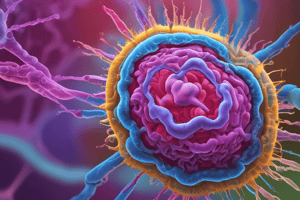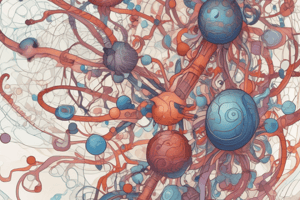Podcast
Questions and Answers
What are the three broad categories of disorders of the immune system?
What are the three broad categories of disorders of the immune system?
- Innate immunity, adaptive immunity, and immunosenescence
- Allergic reactions, autoimmune diseases, and organ transplant rejection
- Hypersensitivity disorders, autoimmune disorders, and immunodeficiency (correct)
- Infection, inflammation, and cancer
What is an antigen?
What is an antigen?
- An offending agent that elicits an immune response (correct)
- A type of antibody
- A type of inflammatory mediator
- A type of immune cell
What is the result of exposure to an antigen?
What is the result of exposure to an antigen?
- Production of inflammatory mediators
- Exposure to antigen → production of antibodies → triggers inflammatory response (correct)
- Exposure to antigen → immune tolerance
- Production of antibodies
What type of cells are involved in an immune response?
What type of cells are involved in an immune response?
What happens in people who are sensitized to an antigen?
What happens in people who are sensitized to an antigen?
What is the outcome of an immune response?
What is the outcome of an immune response?
What is the type of hypersensitivity reaction caused by antibodies that react with antigens present on the cell surface or in the extracellular matrix?
What is the type of hypersensitivity reaction caused by antibodies that react with antigens present on the cell surface or in the extracellular matrix?
What is the result of the binding of antibodies to the TSH receptor on the thyroid cells?
What is the result of the binding of antibodies to the TSH receptor on the thyroid cells?
What is the type of hypersensitivity reaction seen in tuberculosis?
What is the type of hypersensitivity reaction seen in tuberculosis?
What is the result of immune complex deposition in tissue?
What is the result of immune complex deposition in tissue?
What is the definition of autoimmune disease?
What is the definition of autoimmune disease?
What is the type of hypersensitivity reaction seen in anaphylaxis?
What is the type of hypersensitivity reaction seen in anaphylaxis?
What is the result of the binding of antibodies to acetylcholine receptors?
What is the result of the binding of antibodies to acetylcholine receptors?
What is the type of hypersensitivity reaction seen in systemic lupus erythematosus?
What is the type of hypersensitivity reaction seen in systemic lupus erythematosus?
What is the result of the excessive response to an antigen in hypersensitivity reactions?
What is the result of the excessive response to an antigen in hypersensitivity reactions?
What type of hypersensitivity reaction involves an immune response against self-antigens?
What type of hypersensitivity reaction involves an immune response against self-antigens?
What is the term for the underlying familial predisposition to allergy in Type I hypersensitivity reactions?
What is the term for the underlying familial predisposition to allergy in Type I hypersensitivity reactions?
What is the result of the degranulation of mast cells in Type I hypersensitivity reactions?
What is the result of the degranulation of mast cells in Type I hypersensitivity reactions?
What is an example of a Type I hypersensitivity reaction?
What is an example of a Type I hypersensitivity reaction?
What is the term for the life-threatening allergic reaction characterized by vascular shock, widespread oedema, and difficulty breathing?
What is the term for the life-threatening allergic reaction characterized by vascular shock, widespread oedema, and difficulty breathing?
What is the classification of hypersensitivity reactions based on?
What is the classification of hypersensitivity reactions based on?
What is the type of hypersensitivity reaction that involves the formation of immune complexes?
What is the type of hypersensitivity reaction that involves the formation of immune complexes?
Flashcards are hidden until you start studying
Study Notes
Disorders of the Immune System
- There are 3 broad categories of disorders: Hypersensitivity disorders, Autoimmune disorders, and Immunodeficiency.
Hypersensitivity Disorders
- Occurs when the body's defense system overreacts to an antigen, leading to excessive inflammation.
- Classified into 4 types based on the immunologic mechanism that causes the disease.
Type I Hypersensitivity Reaction
- Immediate hypersensitivity reaction
- Caused by IgE antibodies, leading to degranulation of mast cells and release of mediators.
- Examples: Skin allergy (urticaria), Allergic rhinitis, Food allergies, and Systemic anaphylaxis.
Type II Hypersensitivity Reaction
- Caused by antibodies that react with antigens present on the cell surface or in the extracellular matrix.
- Leads to destruction of cells, inflammation, or interference with normal functions.
- Examples: Transfusion reactions, Rhesus incompatibility in pregnant patients, Certain forms of transplant rejection, Glomerulonephritis, Graves disease, and Myasthenia gravis.
Type III Hypersensitivity Reaction
- Immune complex mediated hypersensitivity reaction
- Immune complexes deposit in tissue, causing inflammation and tissue damage.
- Example: Systemic lupus erythematosus.
Type IV Hypersensitivity Reaction
- Cell-mediated type of hypersensitivity reaction (T cells)
- Delayed type hypersensitivity: Antigen activates T cells, leading to inflammatory response.
- Cell-mediated cytotoxicity: Cytotoxic T cells kill antigen-bearing target cells.
- Examples: Tuberculosis, and viral infection.
Autoimmune Disease
- Definition: Immune reaction against self-antigens, resulting in autoantibodies.
- Loss of self-tolerance leads to autoantibodies, inflammatory response, and tissue damage.
- May be organ-specific or systemic.
Studying That Suits You
Use AI to generate personalized quizzes and flashcards to suit your learning preferences.




